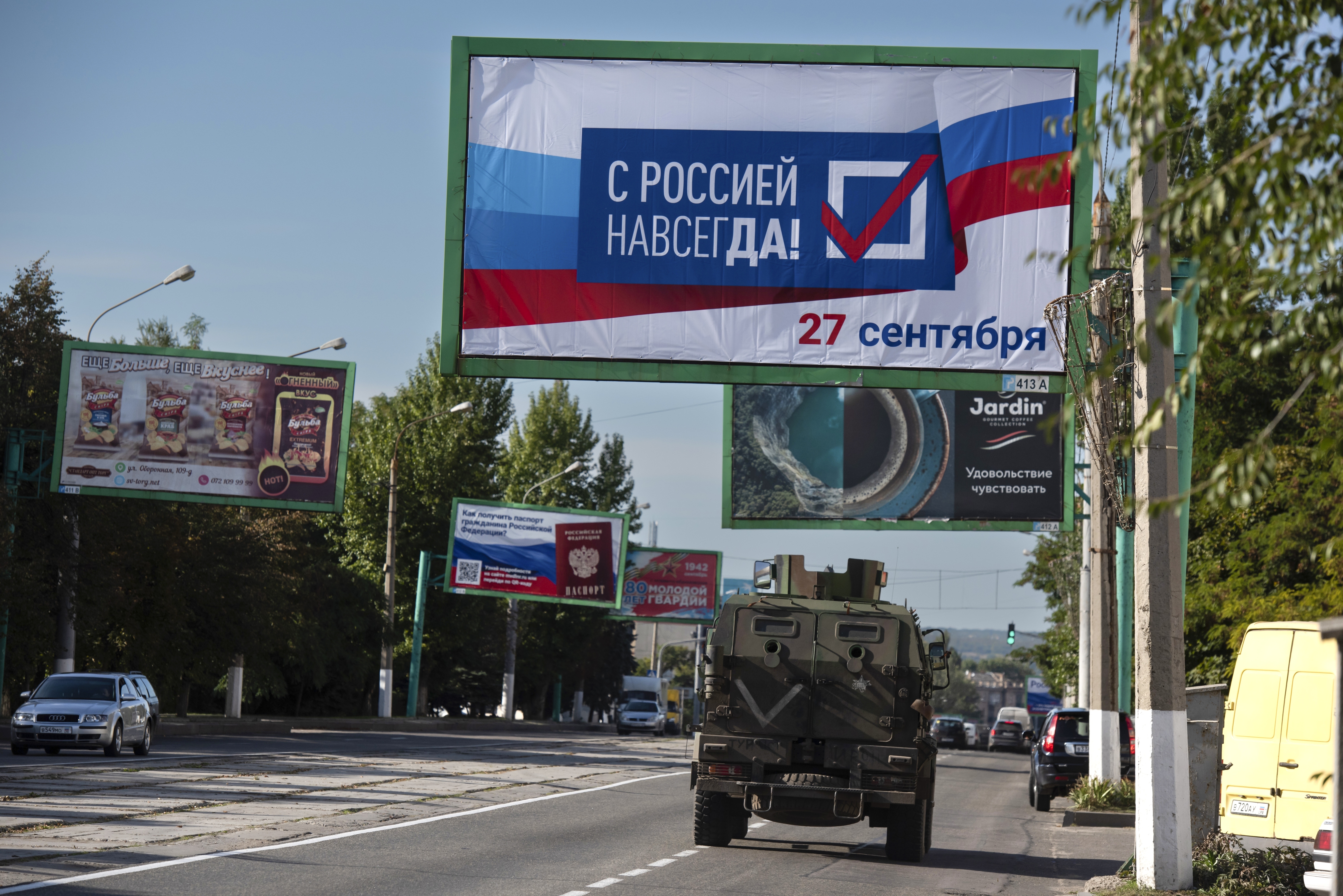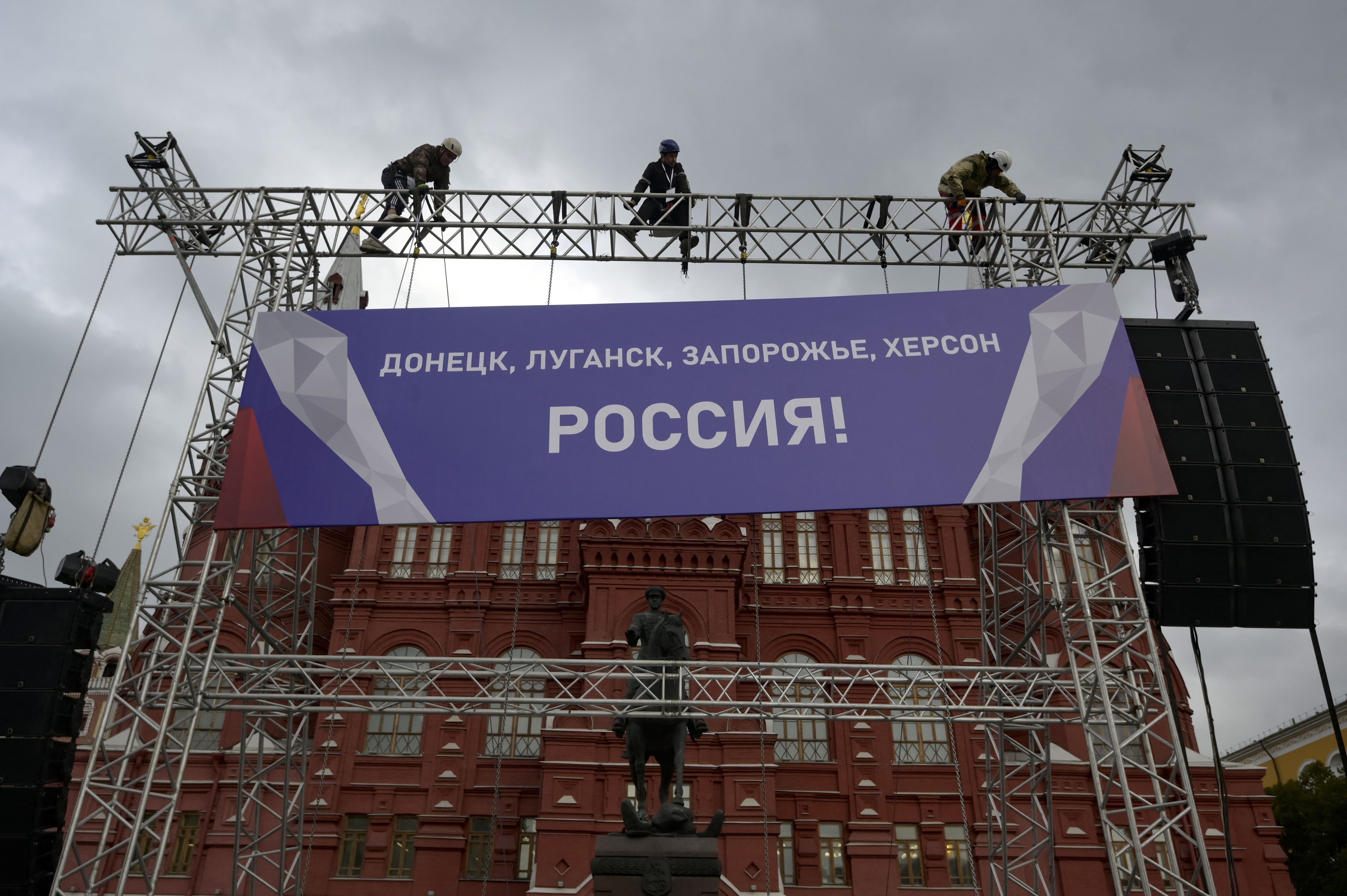
Russian President Vladimir Putin is poised to sign formal documents proclaiming Russia’s annexation of four occupied Ukrainian regions, as Moscow faces its worst setbacks of its war with Ukraine.
Spokesman Dmitry Peskov said Putin will deliver a speech in a ceremony at the Kremlin at 3pm (12:00 GMT) on Friday.
A rock concert is scheduled to be held in Moscow’s Red Square, where a tribune with giant video screens has already been set up, with billboards proclaiming the names of the regions: “Donetsk, Luhansk, Zaporizhia, Kherson – Russia!”

What’s happening?
Russia is set to annex the regions after Russian-installed officials held referendums widely condemned by Kyiv and the West as a “sham”.
Pro-Russian authorities announced that more than 98 percent of voters in the self-proclaimed Luhansk People’s Republic and Donetsk People’s Republic, more than 87 percent in Kherson, and more than 93 percent in Zaporizhia had voted to become part of Russia.
Kyiv and the West denounced the vote as violating international law by taking 15 percent of Ukrainian territory, whose post-Soviet borders Moscow recognised shortly after the fall of the Soviet Union.
Why is Russia proclaiming the annexation of seized Ukrainian territories?
Incorporating the occupied regions into Russia’s territory marks a dramatic escalation in the conflict.
Analysts say the move is meant to show the West that Russia has no intention of backing down from its political and military objectives in its invasion of Ukraine, despite recent military setbacks in the northeast.
Peter Zalmayev, director of the Eurasia Democracy Initiative, told Al Jazeera that “Putin has to show his people that this [war] has been for something” and is hoping annexation of the territories into “Mother Russia” will rekindle his population’s dwindling support.
Moscow is also rushing to lock in territorial claims that the Ukrainian army is threatening to reverse on the battlefield. Ukraine’s troops are gradually encircling the town of Lyman, Russia’s main remaining bastion in the northern part of Donetsk province, whose fall could open the way for Ukrainian attacks on swathes of territory that Russia now aims to annex.
In a speech last week, Putin warned he could use nuclear weapons to defend Russian territory if necessary. Russian government officials have said that the four regions will fall under Moscow’s nuclear umbrella once they have been formally incorporated into Russia.
Who recognises this move as legal?
Even some of Russia’s closest allies – China, India, Kazakhstan, and Serbia – have indicated that they will not recognise the results of the referendums or the annexation.
The United Nations, the United States and Ukrainian officials have all decried the process as a “sham”.
The Group of Seven (G7), an international political coalition comprised of Canada, France, Germany, Italy, Japan, the United Kingdom and the US, also condemned Russia’s referendums as “illegitimate”.
Has this ever happened before?
Russia’s strategy of unilaterally seizing territory held by another state is not new. In February 2014, Russia invaded and subsequently annexed the Crimean Peninsula from Ukraine.
A referendum, which took place without any credible international observers, resulted in 96.7 percent of people voting to join Russia.
Even before Russia’s full-scale invasion of Ukraine in February 2022, its proxies also controlled parts of the Luhansk and Donetsk regions.
The Kremlin has supported and armed two separatist governments in this region, known as the Donbas, since 2014.
In May 2014, breakaway Ukrainian politicians proclaimed that Donetsk and Luhansk were not part of Ukraine, but were independent “republics”. The Kremlin did not officially recognise these newly proclaimed republics until days before the invasion in February 2022.
What might happen next?
Ukrainian President Volodymyr Zelenskyy has warned Russia of a “very harsh” response by Ukraine if Moscow proceeds with the annexation.
The G7 leaders and the US have promised to impose additional sanctions on Russia.
The European Union said it is ready to make the Kremlin pay a “hefty price” for the latest escalation of the conflict.







